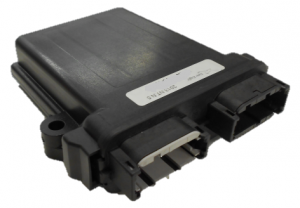PWM to Analog Converter: Difference between revisions
(→FAQ) |
|||
| (2 intermediate revisions by the same user not shown) | |||
| Line 2: | Line 2: | ||
[[image:PWM2analogPicture.png|right|300px]] | [[image:PWM2analogPicture.png|right|300px]] | ||
The New Eagle PWM to Analog Converter converts PWM signals to proportional 0- | The New Eagle PWM to Analog Converter converts PWM signals to proportional 0-5V analog signals. The converter is especially useful when paired with control modules with PWM outputs but no analog outputs. | ||
converter is especially useful when paired with control modules with PWM outputs but no analog outputs. | |||
This device is useful as a pedal emulator for various applications. | This device is useful as a pedal emulator for various applications. | ||
| Line 9: | Line 8: | ||
'''Safety Pulse Feature''' | '''Safety Pulse Feature''' | ||
The safety pulse feature is intended for vehicle pedal applications. This feature ensures that the original pedal | The safety pulse feature is intended for vehicle pedal applications. This feature ensures that the original pedal signal (i.e the analog signal from the actual pedal) will pass through the PWM to Analog box to the OEM ECU unimpeded in the event that the External Control Module (ECM) freezes or loses power. Even though this feature was primarily designed for vehicle pedal applications, a safety pulse signal must be present at the safety pulse input pin (pin 8) for the New Eagle PWM to Analog Converter to function. If no oscillating signal is present at this input pin, the Pass Through signals (Pins 5, 6 and 7) will be routed through the box to the output pins (Pins 9, 10, 11). If the New Eagle PWM to Analog Converter loses power, then its output will default to the Pass Through signals as well. | ||
signal (i.e the analog signal from the actual pedal) will pass through the PWM to Analog box to the OEM ECU | |||
unimpeded in the event that the External Control Module (ECM) freezes or loses power. Even though this | |||
feature was primarily designed for vehicle pedal applications, a safety pulse signal must be present at the safety | |||
pulse input pin (pin 8) for the New Eagle PWM to Analog Converter to function. If no oscillating signal is present | |||
at this input pin, the Pass Through signals (Pins 5, 6 and 7) will be routed through the box to the output pins (Pins | |||
9, 10, 11). If the New Eagle PWM to Analog Converter loses power, then its output will default to the Pass | |||
Through signals as well. | |||
'''Closed Loop Feedback Control Software Library ''' | '''Closed-Loop Feedback Control Software Library ''' | ||
Accuracy is heavily dependent on the design of the particular low side drive. If accuracy is required, closed | Accuracy is heavily dependent on the design of the particular low side drive. If accuracy is required, closed-loop feedback is recommended. New Eagle offers a Feedback Control Software library that allows end users to accurately convert PWM signals into analog signals. | ||
loop feedback is recommended. New Eagle offers a Feedback Control Software library that allows end users | |||
to accurately convert PWM signals into analog signals. | |||
=FAQ= | = Frequently Asked Questions (FAQ) = | ||
Q: Can I drive this with a lower PWM frequency of | Q: Can I drive this with a lower PWM frequency of 1000Hz? | ||
A: Yes, it has a passive first order RC filter. The cut-off frequency is 1/(2*pi*33E3*.1e-6) = 48. | A: Yes, it has a passive first order RC filter. The cut-off frequency is 1/(2*pi*33E3*.1e-6) = 48.2288Hz. | ||
Q: What is its IP Rating? | Q: What is its IP Rating? | ||
Latest revision as of 14:27, 6 February 2023
Overview

The New Eagle PWM to Analog Converter converts PWM signals to proportional 0-5V analog signals. The converter is especially useful when paired with control modules with PWM outputs but no analog outputs.
This device is useful as a pedal emulator for various applications.
Safety Pulse Feature
The safety pulse feature is intended for vehicle pedal applications. This feature ensures that the original pedal signal (i.e the analog signal from the actual pedal) will pass through the PWM to Analog box to the OEM ECU unimpeded in the event that the External Control Module (ECM) freezes or loses power. Even though this feature was primarily designed for vehicle pedal applications, a safety pulse signal must be present at the safety pulse input pin (pin 8) for the New Eagle PWM to Analog Converter to function. If no oscillating signal is present at this input pin, the Pass Through signals (Pins 5, 6 and 7) will be routed through the box to the output pins (Pins 9, 10, 11). If the New Eagle PWM to Analog Converter loses power, then its output will default to the Pass Through signals as well.
Closed-Loop Feedback Control Software Library
Accuracy is heavily dependent on the design of the particular low side drive. If accuracy is required, closed-loop feedback is recommended. New Eagle offers a Feedback Control Software library that allows end users to accurately convert PWM signals into analog signals.
Frequently Asked Questions (FAQ)
Q: Can I drive this with a lower PWM frequency of 1000Hz?
A: Yes, it has a passive first order RC filter. The cut-off frequency is 1/(2*pi*33E3*.1e-6) = 48.2288Hz.
Q: What is its IP Rating?
A: The Duetsch enclosure PN EEC-325X4B is IP67 and IP6K9K.
Q: What connectors/pins are compatible to the PWM Analog converter?
A: New Eagle sells the CON-KIT-DTM24. This is a standard Deutsch DTM06 connector and pins.